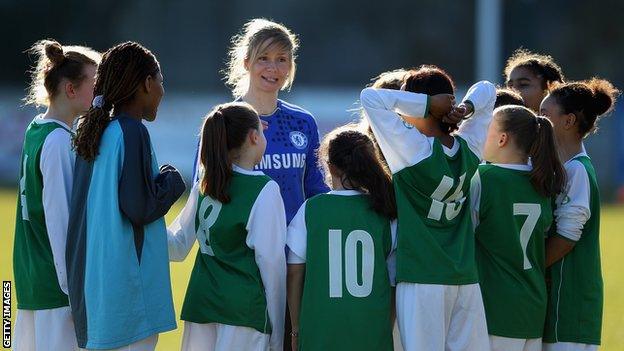School sport: Olympic legacy cannot be taken for granted
- Published
- comments

Today's news that more than a third of school teachers surveyed reported a drop in the number of children exercising, external is another reminder that the Olympic legacy from London 2012 cannot be taken for granted.
The Smith Institute's research, external represents just the latest attack on Education Secretary Michael Gove's decision to axe £162m of ring-fenced funding for School Sport Partnerships (SSPs) in 2011.
The think-tank refers to a "sharp decline" in school sports since that ring-fenced investment (enabling secondary schools to co-ordinate tuition, and lend PE teachers to smaller primaries that needed them) was cut, blaming a lack of funding.
Some £63m was reinstated in a new teacher-release programme and a boosted "School Games". However, according to the Smith Institute, 88% of School Games organisers and school sport co-ordinators said 'the old system was better', and that participation had declined.
Clive Efford, Labour's Shadow Minister for Sport, says the research proves the government's policy was "a disaster for the Olympic legacy... They failed to seize this once-in-a-lifetime opportunity."
However, a Department for Education, external (DfE) spokesman said the research was "self-selecting, including SSP staff themselves, so cannot be taken seriously.
"After seven years of SSPs at a cost of £2.4bn, only around two in five pupils played competitive sport regularly at school."
In March, after months of talks in Whitehall, the government announced £150m of ring-fenced annual funding to go directly to head teachers, and a new national strategy aimed at improving the quality of sport and PE, especially in primary schools.
Under what some have called the "privatisation of PE", schools will hire coaches from specialist providers, governing bodies, or even professional football clubs.
That investment is rolled out from the start of the academic year in September, and there is inevitably now huge interest in whether it can provide a real boost to school sport. But it is still unclear how exactly this spending will be monitored, and what guidance schools will get to make the right choices.
This issue matters greatly. The extent to which our children play sport has an impact far beyond Team GB's long-term medal hopes. At a time of worrying levels of childhood obesity, an active youth can relieve pressure on the National Health Service and even cut crime.
No surprise then, that school sport has been back on the agenda in Westminster this week with the Education Select Committee, external hearing evidence on school sport policy for the first time since the Olympics.
Olympic triple jump legend Jonathan Edwards did not hold back, arguing the government's new policy would result in "patchy provision" and said the demise of SSPs was "a very bad move".
Andy Reed, chairman of the Sport and Recreation Alliance, told the committee: "When we are given a large pot of money, different sport organisations often fight for their slice of the cake.
"We need to see a genuine cross-departmental approach to sport and really strong strategic direction from a central body would assist the sector as a whole."
On the loss of SSPs, Reed added: "We were very disappointed. They made enormous progress in school sports. But that's gone now and so we need to bang heads together to get sport to work together."
Few areas of policy it seem, provoke as much debate or disagreement as school sport. As we approach the first anniversary of the London Games, a consensus seems as far away as ever, but an approach that works is essential, not just for the government, but the country too.
- Published14 May 2013
- Published15 March 2013
- Published12 March 2013
- Published20 February 2013